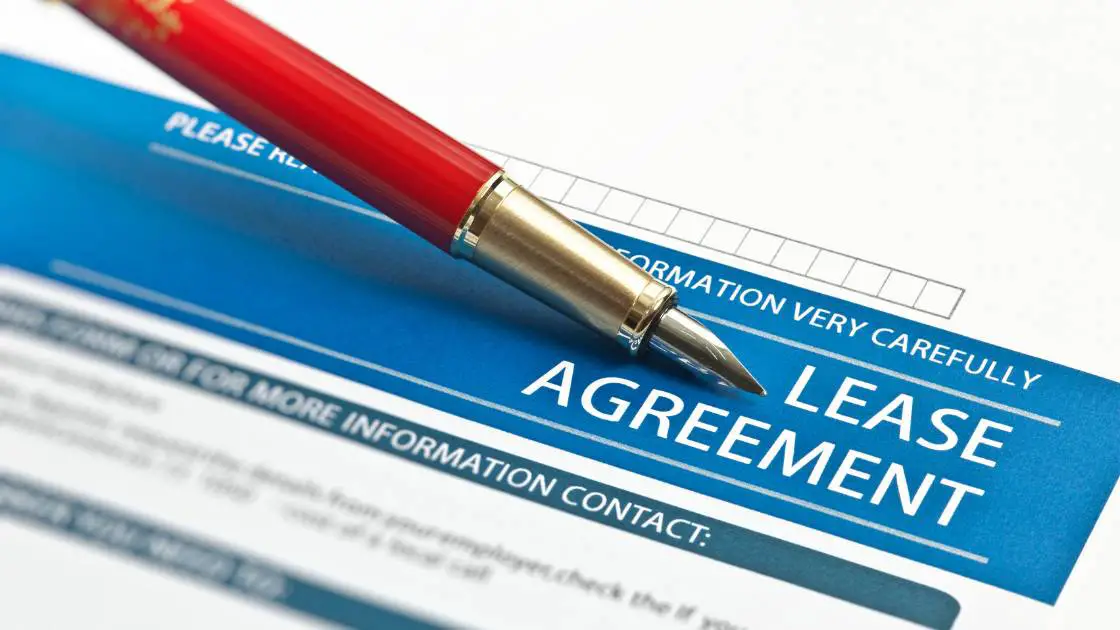If you are looking to break your lease early but are unsure how to proceed, you are in the right place.
In this article, I am going to cover 11 ways to end your lease agreement without penalty (and a bonus method that can apply to all situations).
I’ll explain each method in simple terms (sometimes this stuff can get pretty technical) and provide a bird’s eye view of how they work, but I will also include links to more detailed articles if you want to learn more about them.
As you can see, we’ve got a lot to cover, so let’s get into it.
For a YouTube video on this topic, check out my video version of this article below:
The information contained in this post is for informational purposes only. It is not legal advice. You should seek the advice of a qualified legal professional before making any decisions relating to the topics covered by this article.
We may earn commissions from products and services that are purchased or recommended through our website as part of our affiliate partnerships. As an Amazon affiliate, we may earn from qualifying purchases.
Violations of the Implied Warranty of Habitability

The implied warranty of habitability is a legal doctrine that obligates your landlord to provide a safe and habitable dwelling for you. Almost all jurisdictions have adopted this, so it will likely apply to you regardless of which state you live in. Source
What does this actually mean?
It means that even if your lease doesn’t spell it out, your landlord is required to keep your place livable and safe, including making required repairs.
Here are some conditions that may violate this implied warranty of habitability:
- No running water or heat in the winter
- Significant mold or pest infestations
- Electrical systems that are unsafe or not working
- Broken windows, doors or locks
- Bathrooms and toilets that aren’t working
- Non-compliance with housing codes (e.g., leaky roofs)
Some of the most common reasons for a violation of this implied warranty include the presence of mold or pests (like roaches or mice) or water-based conditions such as a leaky roof or flooded dwelling.
If any of these apply to you, you may have a right to terminate your lease early if your landlord fails to remedy the situation after being notified.
To learn more, check out my articles on whether you can break your lease under these conditions:
- Can I Break My Lease Due to Mold?
- Can I Break My Lease Due to Mice?
- Can I Break My Lease Due to Roaches?
- Can I Break My Lease If My Roof is Leaking?
- Can I Break My Lease If My Apartment Floods?
Landlord’s Breach of Lease Agreement
A landlord has just as much of an obligation to comply with the lease as you do.
So if they are violating it, you may be able to terminate the lease agreement without penalty.
Here are some examples where a landlord may violate the lease agreement:
- Not making required repairs promptly
- Entering the property without notice or consent in violation of lease terms (check lease on when they may enter)
- Not providing agreed upon services (e.g., garbage collection, snow removal, etc.)
- Eliminating pests
Some of the most common situations here include failure to make repairs and entering the property without notice. If you want to learn more about each of these situations, check out my articles below.
- Can I Break My Lease If My Landlord Doesn’t Fix Things?
- How Much Notice Must a Landlord Give Before Entering Premises?
Domestic Violence
Many states give tenants the right to end their lease early if they are the victim of domestic violence.
So if this applies to you and you no longer feel safe in your home, you may be able to break your lease early, provided that your state’s laws permit it.
For your convenience, here’s our 50 state reference table (including D.C.) that will link you to the official landlord tenant laws of your state.
Want an actual lawyer to help? Try Just Answer – they give you a super affordable way to chat with real lawyers. Check out the offer at the end of the article.
In most cases, you will need to provide your landlord with appropriate proof of such abuse, which could include restraining orders, police reports or other legal documentation.
To learn more about when you can break your lease due to domestic violence or other unsafe situations, check out my full article on the topic here.
Victim of Harassment Or Crime
Being a victim of unlawful harassment or a serious crime is another potential way to end your lease early.
Depending on your state’s laws, harassment can include stalking, threats, or other actions that create a potentially unsafe environment for you.
Some states, like California, also allow tenants to get out of a lease if they (or their family) are the victims of sexual assault, human trafficking, elder abuse, or a crime that (i) caused bodily injury or death (ii) include use of a firearm or (iii) included use of force or a threat of force against the victim. Source
As with claims of domestic violence, you will likely need to provide proof of unlawful harassment or crime to get out of your lease.
To learn more, check out my article here (it focuses on restraining orders but has a detailed discussion of this topic as well, including analysis of various state laws).
Violations of Right to Quiet Enjoyment

The covenant of quiet enjoyment is a legal doctrine that states that tenants have the right to have quiet and peaceful possession of their home without undue interference or disruption from their landlord.
However, it is worth noting that this right is conditioned on a tenant paying rent, so if you are behind on the rent and your landlord is bugging you all the time about it, you are out of luck. Source
If your landlord is violating your right to quiet enjoyment, you may have the right to terminate your lease early without any penalty. In some cases, even the actions of your neighbors could give rise to a violation of this right to quiet enjoyment if your landlord can control them and does not.
Here are some examples of potential violations of the covenant of quiet enjoyment:
- Excessively loud or disruptive neighbors
- Landlord going into your home without giving proper notice or consent for an unauthorized purpose
- Excessively frequent or unnecessary inspections
- Landlord contacting you too frequently without good reason
- Construction or renovation that creates unreasonable levels of noise or other disruptive conditions
- Ringing fire alarms that go on for hours without being turned off
In my experience, noise complaints from neighbors and landlords entering into the rental property without proper notice are some of the most common reasons for claiming a violation of the right of quiet enjoyment.
If you want to learn more about each of these situations, check out my articles below.
Disability
If you have become physically or mentally disabled, you may be able to terminate your lease early.
There a number of federal laws that are designed to protect tenants in this situation including the Fair Housing Act (FHA), the Americans with Disabilities Act and Section 504 of the Rehabilitation Act.
I won’t go into the details of each of these laws here, but just know that they exist to protect folks who are suffering from a qualifying disability when it comes to their housing needs.
In most cases, if you qualify, your landlord must make reasonable accommodations for your disability. That may include terminating your lease if you are no longer able to function in a regular rental unit and need specialized care.
As with most of these specialized situations, you have to submit proof of your disability, which usually takes the form of a doctor’s note. You must also give your landlord adequate notice of your intent to leave. In some cases, you may also need to provide proof of your new place which does accommodate your disability.
State and local laws will differ on what’s required.
If you think this situation may apply to you, here are my full articles on the topic.
Military Deployment

You might be eligible to terminate your lease without paying any fees if you are a member of the military and receive orders for deployment. This is because the Servicemembers Civil Relief Act (SCRA) provides active military the right to get out of lease agreements if they are called to deploy.
Under the SCRA, if you signed a lease prior to active duty service, or if you’re already serving on active duty and receive Permanent Change of Station (PCS) or deployment orders for a period of at least 90 days, then you should be able to terminate your housing lease without penalty.
To learn more, check out my article on the topic below – it includes a lot more details on how to do this and what you will need to provide.
Can I Break My Lease If Deployed?
Diplomatic Immunity
If you enjoy diplomatic immunity, you may be able to break your lease early without penalty. I get it- this is not a common situation, but I wanted to include it for the sake of completeness.
If this applies to you, then you would be able to exercise this type of termination unless the landlord received an an appropriate waiver of the immunity that was issued by the sovereign nation (the individual cannot waive the immunity).
Illegal Rental Property
If you’re living in an illegal dwelling, like a garage conversion that wasn’t properly permitted or an extra bedroom that was built out without authorization, you may be able to exit your lease.
As a general matter, landlords need to follow housing codes and rules, including getting proper permits when needed. Failure to do so may make the lease for the place you are renting void.
So if you are living in a place where it seems like the landlord may not have gotten the right permits, you may want to explore this option.
Job Relocation
If your job is relocating you to a place where you can’t reasonably commute there from your current home, you may be able to break your lease if your lease has a job relocation provision.
Many of them do, but you need to read your lease carefully because it may be buried in there. Plus, there may be conditions that you need to follow to exercise that right to terminate.
Often, you will need to give adequate notice, proof of the job relocation (which often needs to be sufficiently far away) and a fee for early exit.
Again, different leases may have different conditions, so you will need to examine your lease with a careful eye.
To learn more about whether you can break your lease in this situation, check out the article below.
Can I Break My Lease If I Change Jobs?
Renovation
You might be eligible to break your lease agreement if your landlord intends to renovate the rental property.
In most cases, the renovation must be significant (i.e., it will interfere with your ability to reside there).
As you can imagine, large renovations project may render the rental home uninhabitable due to noise, dust, and other disturbances, but different states will have different laws on when a termination is permitted, so you should check out your state’s rules.
Negotiated Termination With Landlord
Of course, if all else fails, you can simply talk with your landlord to see if you can negotiate an early termination.
They may be willing to do so if you pay an early termination fee (which may be better than being on the hook for all of your remaining rental payments).
They may also be willing to have someone take over your lease if you are able to find them a replacement. Here’s my article on that topic.
If your landlord is still unwilling to work with you, but you absolutely must leave the property, a final option is to simply vacate the property and hope that the landlord is able to fill it quickly.
There is a legal doctrine called mitigation of damages that usually applies in this situation and if it does, the landlord is obligated to try to fill the vacancy. If he does, he cannot double charge rent to you and the new tenant, so you will be off the hook for future rent once the tenant starts living in the unit.
Now this option comes with risks because the rental market may be soft and the landlord may not be able to find someone quickly, in which case, you will remain on the hook until they do.
Plus, the landlord may decide to sue for any outstanding rent, late fees, and other unpaid obligations, which can seriously impact your credit score and your ability to qualify for a new place.
Again, this should be a last resort.
Closing Thoughts
Breaking a lease is never an easy decision. It often comes with risk and may lead to a fight with your landlord.
But if you are in a situation where you must do so, I hope that this article has been helpful in informing you of your options. Now, I do want to highlight again that breaking a lease should not be taken lightly and there could be serious consequences if you misstep.
If you prefer to have a lawyer assist you, I would try JustAnswer. They boast access to thousands of highly-rated, verified real estate lawyers whom you can connect with via their unlimited chat service.
By clicking the banner below, you can get a one week trial membership for only $5, which you can cancel at any time.



